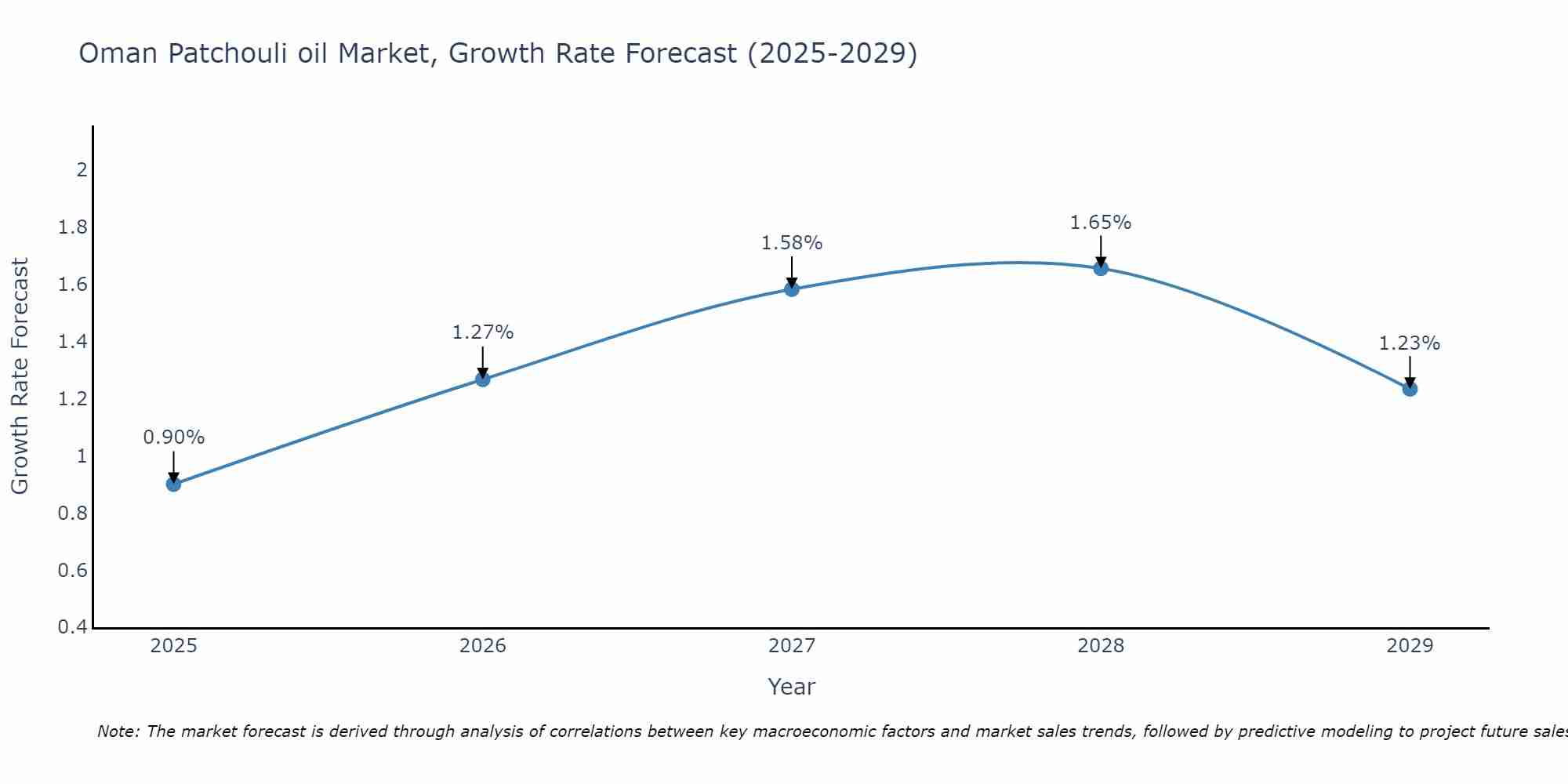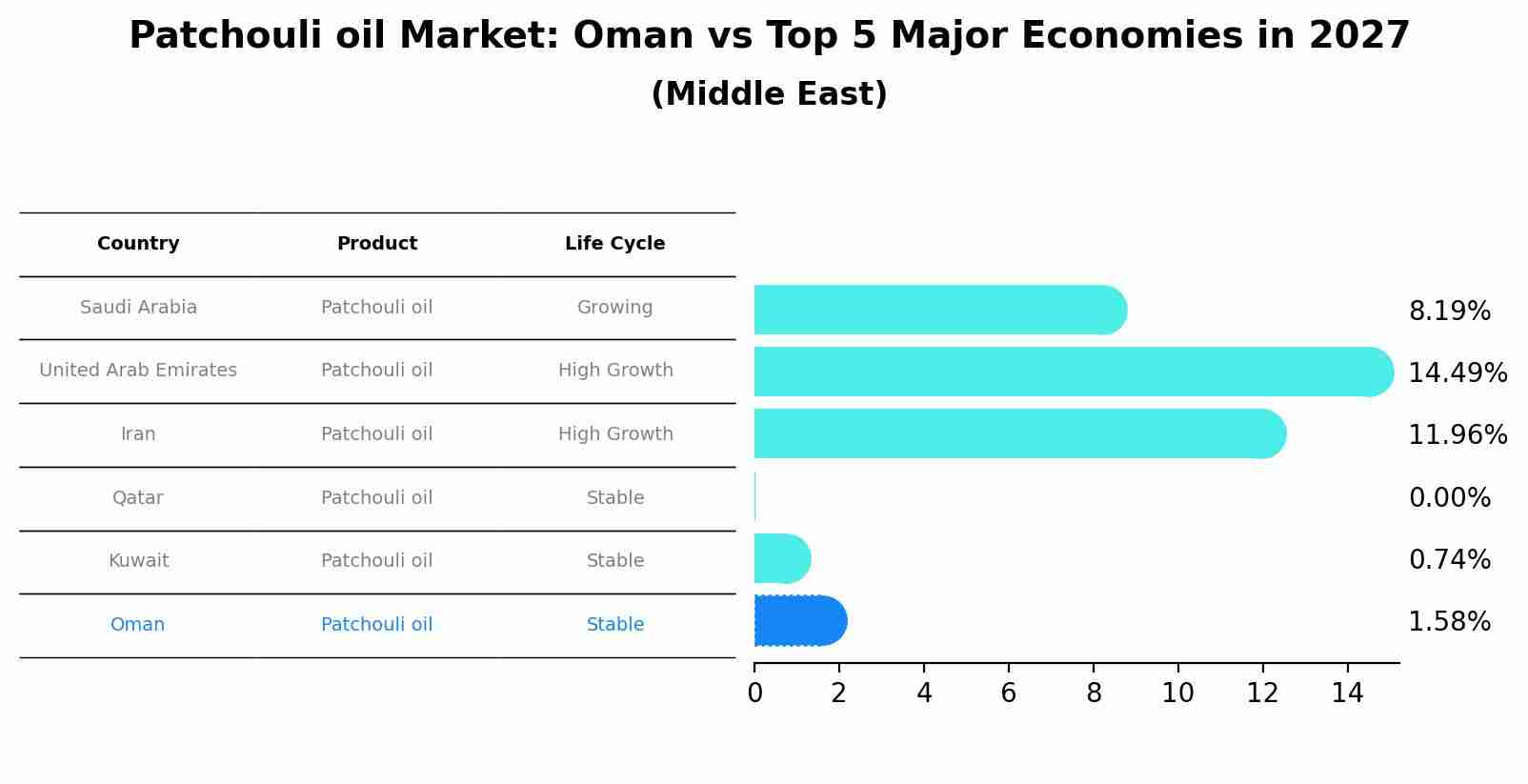Oman Patchouli oil Market Outlook | Share, Value, Trends, Forecast, Analysis, Industry, Growth, COVID-19 IMPACT, Companies, Size & Revenue
| Product Code: ETC093902 | Publication Date: Jun 2021 | Updated Date: Jun 2025 | Product Type: Report | |
| Publisher: 6Wresearch | Author: Ravi Bhandari | No. of Pages: 70 | No. of Figures: 35 | No. of Tables: 5 |
Oman Patchouli oil Market Size Growth Rate
The Oman Patchouli oil Market is projected to witness mixed growth rate patterns during 2025 to 2029. Starting at 0.90% in 2025, the market peaks at 1.65% in 2028, and settles at 1.23% by 2029.

Patchouli oil Market: Oman vs Top 5 Major Economies in 2027 (Middle East)
By 2027, the Patchouli oil market in Oman is anticipated to reach a growth rate of 1.58%, as part of an increasingly competitive Middle East region, where Saudi Arabia remains at the forefront, supported by United Arab Emirates, Iran, Qatar and Kuwait, driving innovations and market adoption across sectors.

Oman Patchouli oil Market Overview
The Oman Patchouli oil market is witnessing steady growth due to the increasing demand for essential oils in various industries such as cosmetics, perfumes, and aromatherapy. Patchouli oil is known for its unique earthy and musky scent, making it a popular choice for fragrance products. Oman`s favorable climate and soil conditions have enabled the cultivation of high-quality Patchouli plants, leading to the production of premium Patchouli oil in the region. The market is also benefiting from the rising consumer awareness regarding the therapeutic and aromatic properties of Patchouli oil. Key players in the Oman Patchouli oil market are focusing on sustainable cultivation practices and product innovation to meet the growing demand for natural and organic products in the market.
Oman Patchouli oil Market Trends
In the Oman Patchouli oil market, there is a growing trend towards sustainable and organic production methods. Consumers are increasingly looking for ethically sourced and environmentally friendly products, leading to a rise in demand for organic Patchouli oil. Additionally, there is a shift towards using Patchouli oil in various industries beyond traditional perfumery, such as in aromatherapy, cosmetics, and personal care products. The market is also seeing an increasing focus on quality control and certification to ensure the purity and authenticity of Patchouli oil. Overall, the Oman Patchouli oil market is evolving to meet the changing preferences of consumers towards sustainable and high-quality products.
Oman Patchouli oil Market Challenges
In the Oman Patchouli oil market, one of the major challenges faced is the limited production capacity. Patchouli plants require specific growing conditions and expertise, which can restrict the volume of oil that can be produced. Additionally, fluctuations in weather conditions and natural disasters can impact the growth of Patchouli plants, leading to supply shortages and price volatility. Another challenge is the competition from other global suppliers of Patchouli oil, which can affect Oman`s market share and pricing competitiveness. Furthermore, ensuring consistent quality standards and meeting regulatory requirements for export can be challenging for Patchouli oil producers in Oman. Overall, addressing these challenges will be crucial for the sustainable growth and competitiveness of the Oman Patchouli oil market.
Oman Patchouli oil Market Investment Opportunities
The Oman Patchouli oil market presents promising investment opportunities due to the increasing demand for natural and organic products in the fragrance and cosmetics industries. Patchouli oil is widely used in perfumes, aromatherapy, and skincare products for its distinctive earthy and musky aroma. With Oman`s favorable climate for cultivating patchouli and the growing trend towards sustainable and eco-friendly products, investing in patchouli oil production and processing facilities in Oman could be lucrative. Additionally, the rising awareness of the health and wellness benefits of patchouli oil further enhances its market potential. Investors can explore partnerships with local farmers for sourcing raw materials, establishing distillation units, and developing distribution channels to capitalize on the growing demand for high-quality Patchouli oil in both domestic and international markets.
Oman Patchouli oil Market Government Policy
Government policies related to the Oman Patchouli oil market focus on sustainability, quality control, and promotion of local production. The Omani government has implemented strict regulations to ensure the sustainable harvesting and cultivation of Patchouli plants to protect the environment and maintain biodiversity. Quality control measures are also in place to ensure that Patchouli oil produced in Oman meets international standards, enhancing the country`s reputation as a reliable supplier. Furthermore, the government provides support and incentives to local farmers and producers to encourage the growth of the Patchouli oil industry and reduce dependency on imports. By fostering a conducive regulatory environment and promoting local production, the Omani government is working towards the development and growth of the Patchouli oil market in the country.
Oman Patchouli oil Market Future Outlook
The future outlook for the Oman Patchouli oil market appears promising due to increasing demand for natural and sustainable fragrances in various industries such as cosmetics, perfumery, and aromatherapy. Patchouli oil is known for its unique earthy and musky scent, making it a popular choice for fragrance blends and essential oil products. Additionally, Oman`s reputation for producing high-quality Patchouli oil could further boost its market growth potential. With consumers increasingly seeking natural and organic products, the Oman Patchouli oil market is expected to experience steady growth as companies look to incorporate this sought-after ingredient into their product offerings. Overall, the market is likely to expand as the demand for natural fragrances continues to rise globally.
Key Highlights of the Report:
- Oman Patchouli oil Market Outlook
- Market Size of Oman Patchouli oil Market, 2021
- Forecast of Oman Patchouli oil Market, 2027
- Historical Data and Forecast of Oman Patchouli oil Revenues & Volume for the Period 2018 - 2027
- Oman Patchouli oil Market Trend Evolution
- Oman Patchouli oil Market Drivers and Challenges
- Oman Patchouli oil Price Trends
- Oman Patchouli oil Porter's Five Forces
- Oman Patchouli oil Industry Life Cycle
- Historical Data and Forecast of Oman Patchouli oil Market Revenues & Volume By Type for the Period 2018 - 2027
- Historical Data and Forecast of Oman Patchouli oil Market Revenues & Volume By Dark Patchouli Oil for the Period 2018 - 2027
- Historical Data and Forecast of Oman Patchouli oil Market Revenues & Volume By Light Patchouli Oil for the Period 2018 - 2027
- Historical Data and Forecast of Oman Patchouli oil Market Revenues & Volume By Application for the Period 2018 - 2027
- Historical Data and Forecast of Oman Patchouli oil Market Revenues & Volume By Perfumery for the Period 2018 - 2027
- Historical Data and Forecast of Oman Patchouli oil Market Revenues & Volume By Medicine for the Period 2018 - 2027
- Historical Data and Forecast of Oman Patchouli oil Market Revenues & Volume By Flavorings for the Period 2018 - 2027
- Historical Data and Forecast of Oman Patchouli oil Market Revenues & Volume By Others for the Period 2018 - 2027
- Oman Patchouli oil Import Export Trade Statistics
- Market Opportunity Assessment By Type
- Market Opportunity Assessment By Application
- Oman Patchouli oil Top Companies Market Share
- Oman Patchouli oil Competitive Benchmarking By Technical and Operational Parameters
- Oman Patchouli oil Company Profiles
- Oman Patchouli oil Key Strategic Recommendations
Frequently Asked Questions About the Market Study (FAQs):
- Single User License$ 1,995
- Department License$ 2,400
- Site License$ 3,120
- Global License$ 3,795
Search
Thought Leadership and Analyst Meet
Our Clients
Related Reports
- Afghanistan Rocking Chairs And Adirondack Chairs Market (2026-2032) | Size & Revenue, Competitive Landscape, Share, Segmentation, Industry, Value, Outlook, Analysis, Trends, Growth, Forecast, Companies
- Afghanistan Apparel Market (2026-2032) | Growth, Outlook, Industry, Segmentation, Forecast, Size, Companies, Trends, Value, Share, Analysis & Revenue
- Canada Oil and Gas Market (2026-2032) | Share, Segmentation, Value, Industry, Trends, Forecast, Analysis, Size & Revenue, Growth, Competitive Landscape, Outlook, Companies
- Germany Breakfast Food Market (2026-2032) | Industry, Share, Growth, Size, Companies, Value, Analysis, Revenue, Trends, Forecast & Outlook
- Australia Briquette Market (2025-2031) | Growth, Size, Revenue, Forecast, Analysis, Trends, Value, Share, Industry & Companies
- Vietnam System Integrator Market (2025-2031) | Size, Companies, Analysis, Industry, Value, Forecast, Growth, Trends, Revenue & Share
- ASEAN and Thailand Brain Health Supplements Market (2025-2031) | Strategy, Consumer Insights, Analysis, Investment Trends, Opportunities, Growth, Size, Share, Industry, Revenue, Segments, Value, Segmentation, Supply, Forecast, Restraints, Outlook, Competition, Drivers, Trends, Demand, Pricing Analysis, Competitive, Strategic Insights, Companies, Challenges
- ASEAN Bearings Market (2025-2031) | Strategy, Consumer Insights, Analysis, Investment Trends, Opportunities, Growth, Size, Share, Industry, Revenue, Segments, Value, Segmentation, Supply, Forecast, Restraints, Outlook, Competition, Drivers, Trends, Demand, Pricing Analysis, Competitive, Strategic Insights, Companies, Challenges
- Europe Flooring Market (2025-2031) | Outlook, Share, Industry, Trends, Forecast, Companies, Revenue, Size, Analysis, Growth & Value
- Saudi Arabia Manlift Market (2025-2031) | Outlook, Size, Growth, Trends, Companies, Industry, Revenue, Value, Share, Forecast & Analysis
Industry Events and Analyst Meet
Whitepaper
- Middle East & Africa Commercial Security Market Click here to view more.
- Middle East & Africa Fire Safety Systems & Equipment Market Click here to view more.
- GCC Drone Market Click here to view more.
- Middle East Lighting Fixture Market Click here to view more.
- GCC Physical & Perimeter Security Market Click here to view more.
6WResearch In News
- Doha a strategic location for EV manufacturing hub: IPA Qatar
- Demand for luxury TVs surging in the GCC, says Samsung
- Empowering Growth: The Thriving Journey of Bangladesh’s Cable Industry
- Demand for luxury TVs surging in the GCC, says Samsung
- Video call with a traditional healer? Once unthinkable, it’s now common in South Africa
- Intelligent Buildings To Smooth GCC’s Path To Net Zero


















